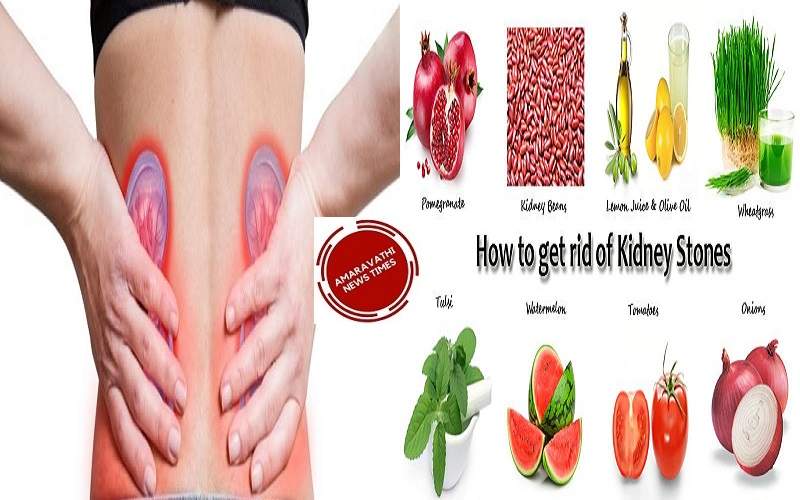
Health & Diet Tips to Reduce Kidney Stones in Natural Ways without Medicines – Kidney Stones Symptoms & Remedies – Kidney Stones Treatment

Kidney stones can be quite painful and disruptive to daily life. While it’s important to consult a healthcare professional for a proper diagnosis and treatment plan, there are also some natural approaches you can try to help reduce the risk of kidney stones. Here are a few suggestions:
Stay Hydrated:
Drinking an adequate amount of water is crucial in preventing kidney stones. It helps dilute the urine, making it less concentrated and reducing the chances of stone formation. Aim to drink at least 8-10 glasses of water a day, or more if you live in a hot climate or engage in intense physical activity.
Eat a Balanced Diet:
Focus on a diet rich in fruits, vegetables, whole grains, and lean proteins. Limit your intake of processed foods, salt, and sugar. Certain foods may increase the risk of kidney stones, such as oxalate-rich foods (spinach, rhubarb, beets, etc.) and foods high in animal protein. Moderation is key.
Increase Citrate Intake:
Citrate is a natural inhibitor of stone formation. Consuming citrate-rich foods or drinks can help reduce the risk of kidney stones. Good sources of citrate include lemons, oranges, limes, and melons. You can also try drinking lemon water or adding lemon juice to your water throughout the day.
Limit Sodium Intake:
A high-sodium diet can increase the excretion of calcium in the urine, which may contribute to stone formation. Be mindful of your salt intake and avoid processed foods that are typically high in sodium. Opt for natural herbs and spices to flavour your meals instead.
Maintain a Healthy Weight:
Obesity and excess weight can increase the risk of kidney stones. Focus on maintaining a healthy weight through regular exercise and a balanced diet. Losing weight if you are overweight can be beneficial in preventing kidney stone formation.
Consume Calcium-Rich Foods Wisely:
Contrary to popular belief, adequate calcium intake from food sources can help prevent kidney stones. However, calcium supplements may increase the risk. It’s best to obtain calcium from food sources like low-fat dairy products, leafy greens, and fortified foods.
Moderate Oxalate Intake:
Oxalate is found in certain foods and can contribute to the formation of calcium oxalate kidney stones. While it’s not necessary to completely eliminate high-oxalate foods, moderating their intake may be beneficial. Examples of high-oxalate foods include spinach, rhubarb, beets, nuts, tea, and chocolate. Speak with a healthcare professional or dietitian to determine the appropriate oxalate intake for your specific situation.
Oxalates can contribute to certain types of kidney stones. While it’s not necessary to completely eliminate oxalate-rich foods, it’s wise to moderate their consumption. Some high-oxalate foods include spinach, rhubarb, beets, nuts, chocolate, and tea.
Limit Soda and Alcohol:
Carbonated drinks and excessive alcohol consumption can contribute to stone formation. Limit your intake of soda and alcoholic beverages, as they can dehydrate the body and increase the concentration of stone-forming substances in the urine.
Consume Adequate Fibre:
A diet rich in fibre from fruits, vegetables, and whole grains may help lower the risk of kidney stones. Fibre can help regulate digestion and prevent excessive calcium and oxalate absorption in the intestines.
Moderate Animal Protein:
Animal protein, such as meat, poultry, and seafood, can increase the levels of uric acid and calcium in your urine, potentially leading to stone formation. Limit your intake of animal protein and consider substituting some of it with plant-based protein sources like legumes, tofu, or tempeh.
Remember, these natural approaches should be used in conjunction with medical advice and treatment. Each person’s situation is unique, and a healthcare professional can provide tailored guidance based on your specific needs.
Symptoms for Kidney Stones:
Kidney stones can cause a variety of symptoms, and the specific symptoms experienced can vary from person to person. Some common symptoms of kidney stones include:
Severe Pain:
The most prominent symptom of kidney stones is intense pain. This pain often begins suddenly and can be felt in the side or back, below the ribs. The pain may radiate to the lower abdomen and groin.
Hematuria:
Blood in the urine, known as hematuria, is another common symptom. The urine may appear pink, red, or brown in color. However, not all kidney stones cause visible blood in the urine.
Urinary changes:
Kidney stones can lead to changes in urinary patterns. This may include increased frequency of urination, urgent need to urinate, or difficulty in urinating.
Cloudy or Foul-smelling Urine:
The presence of kidney stones can sometimes cause the urine to become cloudy or have an unpleasant odor.
Nausea and Vomiting:
Some individuals with kidney stones may experience nausea and vomiting, often as a result of the severe pain.
Fever and Chills:
If a kidney stone causes an infection or leads to blockage of the urinary tract, fever and chills may occur.
It’s important to note that smaller kidney stones may not cause any noticeable symptoms and can pass through the urinary system without causing significant discomfort. However, larger stones or those causing complications can lead to severe symptoms. If you suspect you may have kidney stones, it’s advisable to consult a healthcare professional for an accurate diagnosis and appropriate treatment.
Treatment of Kidney Stones:
The treatment of kidney stones depends on various factors, including the size and location of the stones, symptoms experienced by the individual, and the overall health of the patient. Here are some common treatment options for kidney stones:
Observation:
Small kidney stones that do not cause significant symptoms or complications may be observed over time. Drinking plenty of fluids and taking pain medications can help manage the symptoms until the stones pass naturally.
Medications:
Certain medications can help facilitate the passage of kidney stones or reduce the symptoms associated with them. These medications may include alpha blockers, which relax the muscles in the urinary tract, or medications to control pain and inflammation.
Extracorporeal Shock Wave Lithotripsy (ESWL):
This non-invasive procedure uses shock waves to break the kidney stones into smaller fragments, making them easier to pass through the urinary tract. The fragments are then passed naturally during urination.
Ureteroscopy:
This procedure involves the use of a thin, flexible tube (ureteroscope) that is inserted through the urethra and bladder to reach the ureter or kidney. Small instruments can be passed through the ureteroscope to break up or remove the stones. Ureteroscopy is often used for stones located in the lower urinary tract or in the ureter.
Percutaneous Nephrolithotomy (PCNL):
This is a surgical procedure performed for larger kidney stones or those that are not amenable to other treatments. A small incision is made in the back, and a nephroscope is used to directly access and remove the stones from the kidney.
Open Surgery:
In rare cases where other treatments are not feasible or have failed, open surgery may be necessary. This involves making a larger incision to directly remove the kidney stones.
In addition to these treatments, lifestyle modifications can help prevent the formation of kidney stones in the future. Drinking plenty of fluids, especially water, can help dilute urine and reduce the risk of stone formation. Dietary changes, such as reducing salt and animal protein intake while increasing the consumption of fruits and vegetables, may also be recommended.
It is important to consult with a healthcare professional to determine the most suitable treatment approach based on your specific situation.



